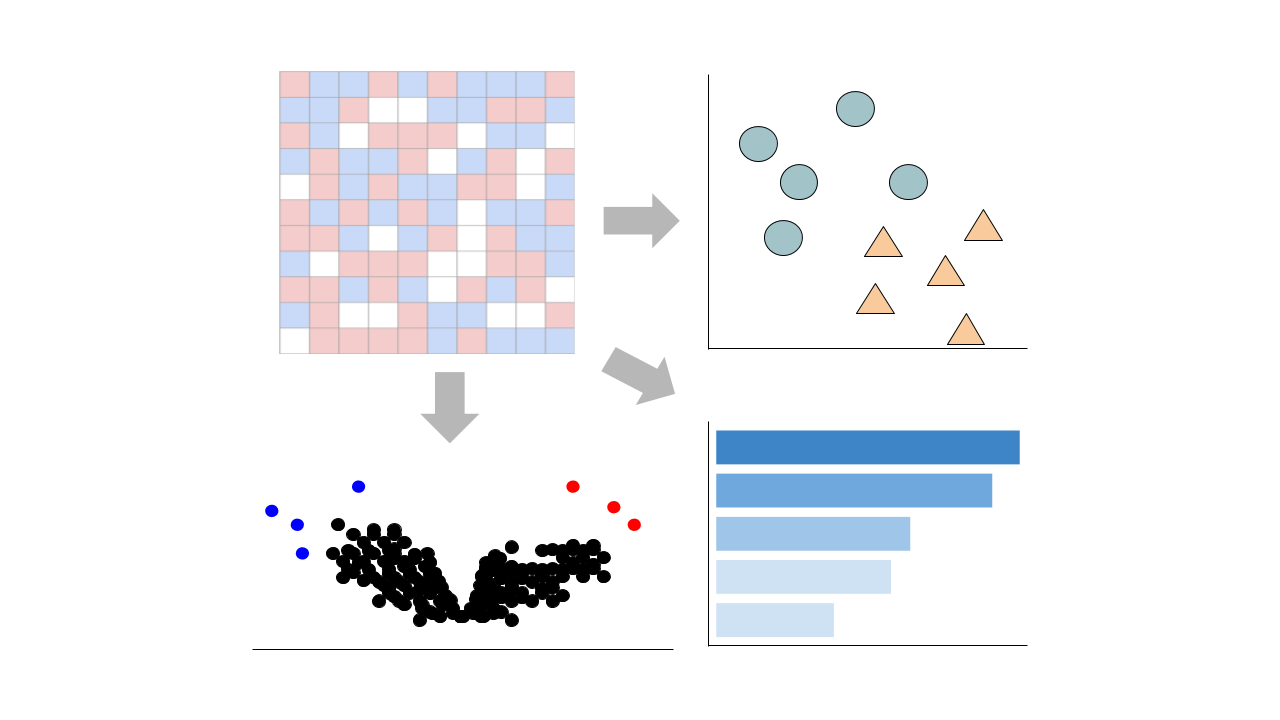 Gene counts are sourced from ARCHS4, which provides uniform alignment of GEO samples.
You can learn more about ARCHS4 and its pipeline here.
Gene counts are sourced from ARCHS4, which provides uniform alignment of GEO samples.
You can learn more about ARCHS4 and its pipeline here.
Select conditions below to toggle them from the plot:
| GROUP | CONDITION | SAMPLES |
|---|---|---|
| S961 treated |
GSM4072675 GSM4072676 GSM4072677 GSM4072678 GSM4072679 GSM4072680 GSM4072681 GSM4072682
|
|
|
GSM4072689 GSM4072690 GSM4072691 GSM4072692 GSM4072693 GSM4072694 GSM4072695 GSM4072696
|
||
| Saline treatment |
GSM4072669 GSM4072670 GSM4072671 GSM4072672 GSM4072673 GSM4072674
|
|
|
GSM4072683 GSM4072684 GSM4072685 GSM4072686 GSM4072687 GSM4072688
|
Submission Date: Sep 10, 2019
Summary: In the pathogenesis of type 2 diabetes development of insulin resistance triggers an increase in pancreatic β-cell insulin secretion capacity and β-cell number. Failure of this compensatory mechanism is caused by a dedifferentiation of β-cells, which leads to insufficient insulin secretion and diabetic hyperglycemia. The β-cell factors that normally protect against dedifferentiation remain poorly defined. Here, through a systems biology approach, we identify the transcription factor Klf6 as a regulator of β-cell adaptation to metabolic stress. We show that inactivation of Klf6 in mouse β-cells blunts their proliferation induced by the insulin resistance of pregnancy, high-fat high-sucrose feeding, and insulin receptor antagonism. Transcriptomic analysis showed that Klf6 controls the expression of β-cell proliferation genes and, in the presence of insulin resistance, it prevents the down-expression of genes controlling mature β-cell identity and the induction of disallowed genes that impair insulin secretion; its expression also limits the transdifferentiation of β-cells into alpha cells. Our study identifies a new transcription factor that protects β-cells against dedifferentiation and which may be targeted to prevent diabetes development.
GEO Accession ID: GSE137187
PMID: 32244185
Submission Date: Sep 10, 2019
Summary: In the pathogenesis of type 2 diabetes development of insulin resistance triggers an increase in pancreatic β-cell insulin secretion capacity and β-cell number. Failure of this compensatory mechanism is caused by a dedifferentiation of β-cells, which leads to insufficient insulin secretion and diabetic hyperglycemia. The β-cell factors that normally protect against dedifferentiation remain poorly defined. Here, through a systems biology approach, we identify the transcription factor Klf6 as a regulator of β-cell adaptation to metabolic stress. We show that inactivation of Klf6 in mouse β-cells blunts their proliferation induced by the insulin resistance of pregnancy, high-fat high-sucrose feeding, and insulin receptor antagonism. Transcriptomic analysis showed that Klf6 controls the expression of β-cell proliferation genes and, in the presence of insulin resistance, it prevents the down-expression of genes controlling mature β-cell identity and the induction of disallowed genes that impair insulin secretion; its expression also limits the transdifferentiation of β-cells into alpha cells. Our study identifies a new transcription factor that protects β-cells against dedifferentiation and which may be targeted to prevent diabetes development.
GEO Accession ID: GSE137187
PMID: 32244185
Visualize Samples
 Visualizations are precomputed using the Python package scanpy on the top 5000 most variable genes.
Visualizations are precomputed using the Python package scanpy on the top 5000 most variable genes.
Precomputed Differential Gene Expression
 Differential expression signatures are automatically computed using the limma R package.
More options for differential expression are available to compute below.
Differential expression signatures are automatically computed using the limma R package.
More options for differential expression are available to compute below.
Signatures:
Select conditions:
Control Condition
Perturbation Condition
Only conditions with at least 1 replicate are available to select
 Differential expression signatures can be computed using DESeq2 or characteristic direction.
Differential expression signatures can be computed using DESeq2 or characteristic direction.
This pipeline enables you to analyze and visualize your bulk RNA sequencing datasets with an array of downstream analysis and visualization tools. The pipeline includes: PCA analysis, Clustergrammer interactive heatmap, library size analysis, differential gene expression analysis, enrichment analysis, and L1000 small molecule search.

 Chatbot
Chatbot Single Gene Queries
Single Gene Queries
 Gene Set Queries
Gene Set Queries
 Bulk Studies
Bulk Studies
 Single Cell Studies
Single Cell Studies
 Hypotheses
Hypotheses
 Resources
Resources
 Contribute
Contribute
 Downloads
Downloads About
About
 Help
Help